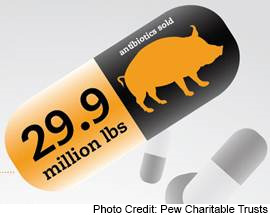Alexander Fleming’s discovery of penicillin was a breakthrough in modern medicine, and who of us hasn’t relied on the effectiveness of antibiotics to cure an infection at some point in our lives? The overuse of antibiotics, however, is leading to an increase of drug-resistant “superbugs” which cause harder-to-treat and more-likely-to-be-lethal infections. Doctors across the country have recognized this threat, and have stopped the practice of over prescribing. Despite this effort, one industry gets away with unchecked and unregulated use of antibiotics: animal agriculture.
Industrial animal farms add low-level antibiotics (often without veterinary oversight) to animal feed to foster faster growth and mitigate the spread of disease caused by keeping thousands of animals in cramped, filthy factory farms.
To make matters worse, the use of antibiotics to combat the squalid conditions farmed animals face on a daily basis has been on the rise.
According to Pew Charitable Trusts, a record high 29.9 million pounds of antibiotics were sold for meat production in 2011. In the same period of time, only 7.7 million pounds were sold for human use. That means for every one pound of antibiotics used to treat infections in humans, four pounds of antibiotics were given to already healthy animals. (View infographic created by Pew.)
The routine use of antibiotics on factory farms has been largely unchecked—but those days may be numbered. In Maryland, Senator Karen Montgomery has introduced legislation requiring meat to carry a label clearly identifying which types of antibiotics the animals were fed. (Last year, Maryland became the first state to pass a law banning the use of arsenic —yes, poison! — in chicken feed.)
And just last week, Congressmen Henry Waxman and Congresswoman Louise Slaughter introduced the Delivering Antimicrobial Transparency in Animals (DATA) Act (H.R. 820), which would authorize the U.S. Food and Drug Administration (FDA) to collect and report data on antibiotic use in factory farms.
While these pieces of legislation are positive steps, each one of us can take our own steps today to protect our health and to protect animals simply by choosing vegetarian foods. Visit TryVeg.com to learn more.

